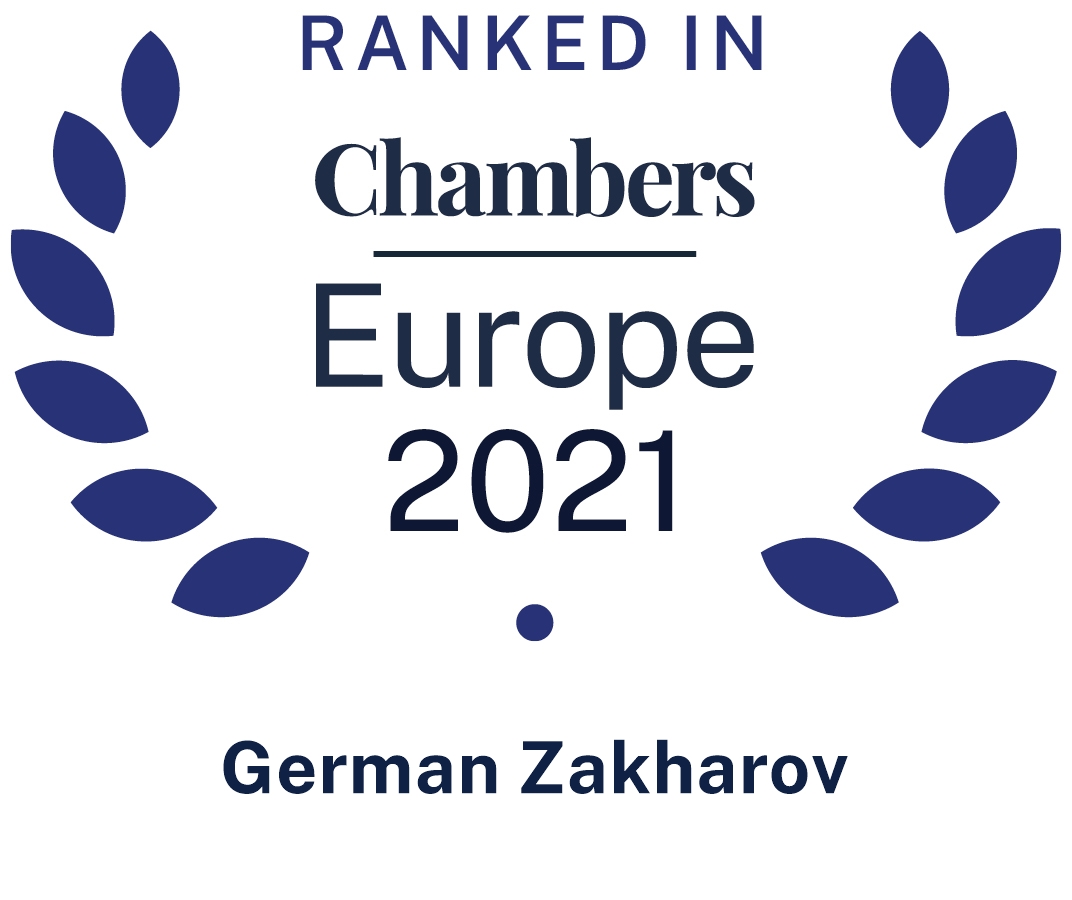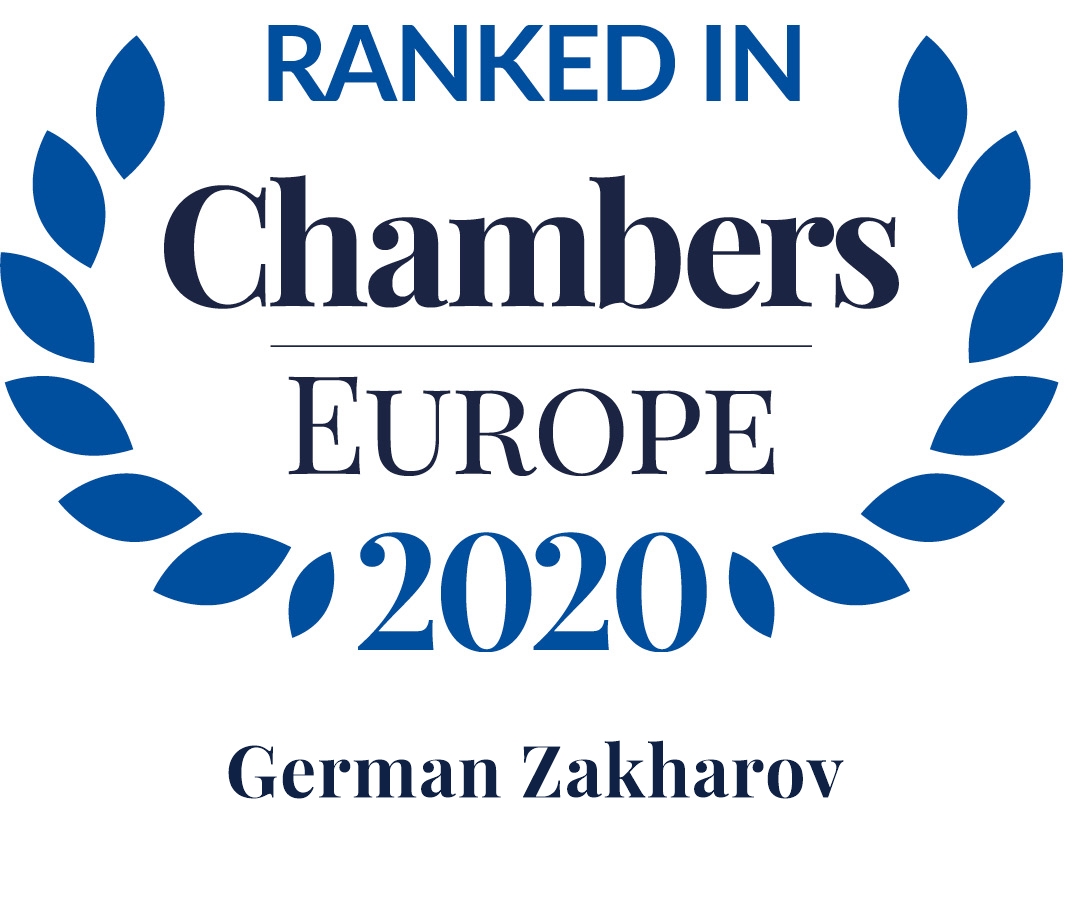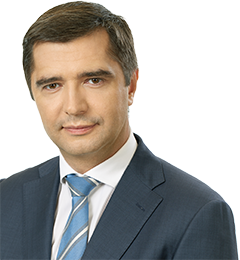German Zakharov and Roman Vedernikov spoke at the Pravo.ru conference “Legal Challenges and Opportunities in the Age of Sanctions”
On 14 March 2024 a conference on "Legal Challenges and Opportunities in the Age of Sanctions" organized by Pravo.ru was held.
German Zakharov, ALRUD Partner, acted as a moderator at the 3rd session: “Prevention and management of sanctions risks: current practice, national peculiarities of sanctions compliance”.
Roman Vedernikov, Senior Associate in ALRUD Antitrust Practice, spoke at the 3rd session on “Over-compliance in the sanctions environment: analysis of judicial approaches relating to the arguments of an aggrieved counterparty”.
Speaking on the topic, the expert defined the concept of over-compliance, its key factors, and also reviewed foreign court practice. Roman came to the following conclusion: “Foreign participants assess risks of legal and secondary sanctions exposure very high, sometimes even if the person is not actually subject to sanctions, and/or the parties to the transaction have no relation to the jurisdictions that imposed the sanctions. This leads to over-compliance that gives rise to greater discrimination. But legal proceedings in various jurisdictions suggest that there are some positive trends to a more balanced and unbiased approach”.
Read more (in Russian) about the event here.
15 March 2024
ALRUD Team supported AGC in a transaction on the sale of Russian assets to a Russian investor
ALRUD Law Firm represented AGC in a transaction on the sale of its two glass manufacturing subsidiaries in Russia (Bor Glassworks and Klin Glassworks).
Mr. Igor Mikhailovich Leytis, a profile investor, acted as the Purchaser under the transaction.
ALRUD Team provided comprehensive legal support for the transaction, including preparation of legally binding documentation, control over compliance with the conditions precedent, transaction closing, and advising on the transaction clearance procedure within the Russian perimeter.
ALRUD Team working on the project included Andrey Zharskiy, Partner of the Corporate and M&A Practice, German Zakharov, Partner of the Competition/Antitrust Practice, Oleg Ezhov, Of Counsel, Daniil Lozovsky, Senior Associate, Sofia Derbeneva, Associate, and Natella Kortiashvili, Associate.
06 March 2024
Corporate and Regulatory Issues for Foreign Shareholders in Russia: Key Issues to Consider in 2024
Dear Ladies and Gentlemen,
Special economic measures introduced in 2022 due to “unfriendly” actions of certain foreign states against the Russian Federation have been subject to development and clarification during 2023. We have already highlighted some key aspects of 2023 countersanctions regulation in another newsletter, and here we would like to pay more attention to the corporate and some other regulatory issues.
1. Corporate transactions approval procedure
As a reminder, the transactions aimed directly or indirectly at disposal of shares/participatory interests in Russian companies, entered into with persons of “unfriendly” foreign states, as well as payments in favor of “unfriendly” participants/shareholders in case of charter capital decrease or liquidation of a Russian company without using a type ‘C’ account (provided that the payment exceeds RUB 10 mln threshold per month) require clearance in accordance with several countersanctions decrees of the Russian President.
However, before an application for granting permission for a transaction/operation is passed to the Sub-Commission of the Government Commission for Control over Foreign Investments (the “Sub-Commission”), it must first receive the support of the “industry-specific” federal executive authority in charge of the area of the target activity (the list is limited to eleven ministries) and the Ministry of Finance.
The procedure for obtaining approvals from the Sub-Commission has become clearer: the consideration process has become more transparent, and approval criteria have been established that must be met in order to obtain a positive decision. The most crucial and ordinary criteria are obligation to transfer to the federal budget a contribution in amount equal to at least 15% of the market value of the respective assets, as well as payments under the transactions (operations) to foreign accounts (regardless of the account currency) in installments. Please note that the final schedule of payments is established by the Sub-Commission, taking into account the position of the Bank of Russia.
2. Liability for non-compliance
As of now, there is no specific liability for conducting transactions/operations in breach of the procedure stipulated by the counter-sanctions decrees (the relevant draft law of the Ministry of Finance introducing special administrative liability has not yet been adopted).
However, execution of transactions/operations without the Sub-Commission approval may entail the following consequences:
{{(A)}} Transaction/operation may be held null and void and formally result in mutual restitution under the general civil law provisions (the prosecutors were given the powers to initiate and participate in relevant judicial proceedings);
{{(B)}} Deprivation of direct participants/shareholders of Russian companies from their voting rights;
{{(C)}} Refusal of Russian banks to conduct payments and refusal of registrars/notaries to register the transfer of title to the shares/participatory interests in Russian companies.
3. Interim administration and related risks
Decree No. 302 of the Russian President provided for introducing interim management in respect of Russian assets of “unfriendly” companies as a response to the deprivation of Russian persons of the title to the property in “unfriendly” countries, or to a threat to Russian security and defense capability.
The interim administration is carried out by Rosimushchestvo/Government of Moscow, that exercises the rights of the owner (except for disposal) and appoints new management bodies. In addition, the interim administration is introduced for an unlimited term and is terminated by a new order of the Russian President.
At present, interim administration is carried out in respect of several major companies significantly influencing the Russian economy in respective areas (Unipro, Fortum, Danone, Baltika (Carlsberg), etc.).
Introduction of the interim management mechanism and the possibility of it being applied to all foreign assets of “unfriendly” non-residents without any particular criteria creates significant additional risks affecting the activity of foreign companies in Russia.
4. Payment of dividends
Payment of dividends to foreign creditors in the amount exceeding RUB 10 mln per calendar month is also restricted. When considering the respective application for making such payment without using a type ‘C’ account, the Sub-Commission pays attention to the number of criteria, especially to the retrospective analysis of payments for the previous periods. In case the company never paid any dividends earlier and accumulated the significant amount of non-distributed moneys, the payment in question may be regarded as siphoning money out of Russia, thus reducing the chances of obtaining the Sub-Commission approval.
However, the distribution of dividends to the foreign creditors may be allowed regardless of compliance with the requirements established by the Sub-Commission, providing that the amount of dividends to be paid does not exceed the amount of investments in Russia. Here, investments made by foreign creditors in the Russian economy since April 01, 2023, including the expansion of production in Russia and the development of new technologies, shall be taken into account. In this case, investments are understood to be new investments in Russia (including through loans, construction of factories, and so on). If a Russian subsidiary invests its profits earned in the Russian Federation, then such an investment is considered an
ordinary business activity.
5. Financial transactions
Restrictions on granting and repaying loans to foreign creditors also continue to apply. In particular, it is prohibited to perform the following operations without a special approval:
foreign currency operations related to providing loans in foreign currency to both “unfriendly” and “friendly” non-residents;
transactions related to granting loans in Rubles to “unfriendly” non-residents;
performing obligations under loans in favor of “unfriendly” non-residents in the amounts exceeding RUB 10 mln per month without using a type ‘C’ account.
The regime of type ‘C’ accounts significantly limits the available operations with funds. The allowed operations include, inter alia, transferring of funds to other type ‘C’ accounts, payment of the debtor’s own taxes and duties in Russia, acquisition of federal loan bonds in auctions. Moreover, currently it is not allowed to transfer money from a type ‘C’ account to ordinary accounts, including with an approval of any kind.
Please also note that according to the non-public clarifications of the Bank of Russia, performing set-offs under loans or other claims (e.g., payment of dividends) with participation of “unfriendly” non-residents, in case payment under such obligations would be subject to counter-sanctions restrictions (i.e. the amounts are to be paid to a type ‘C’ account), constitutes violation of counter-sanctions restrictions.
6. Liquidation of subsidiaries and branches
Currently, it is possible to liquidate companies without any Sub-Commission approval and we dealt with multiple successful cases in our practice. However, according to some notaries, the liquidation itself should also be cleared by the Sub-Commission. In the absence of official clarifications on the necessity for the relevant approval, this issue might be interpreted differently.
Distribution of the liquidation proceeds exceeding RUB 10 mln threshold requires clearance with the Sub-Commission. However, it is quite complicated to obtain approval for such operations as it entails the withdrawal of funds abroad without continuing operations in Russia (i.e. there is no positive effect on socio-economic development of Russia).
21 February 2024
Countersanctions, Foreign Investments, Antitrust and Competition: 2023 Year in Review
The year 2023 was marked by the further strengthening of control over transactions involving the sale of Russian assets owned by “unfriendly” foreign entities, as well as over Russian strategic companies. As for antimonopoly regulation, after several years of discussions and revisions, the fifth antimonopoly package was adopted, and a number of precedent-setting cases were considered. Please see below for more details about the key developments and highlights of 2023.
1. Countersanctions
The procedure has become clearer for obtaining approvals from the Subcommission of the Government Commission for Control over Foreign Investment (the “Subcommission”) for transactions (operations) pursuant to decrees concerning countersanctions: the consideration process has become more transparent, and approval criteria have been established that must be met in order to obtain a positive decision.
When making decisions on transactions (operations), special attention is paid to financial issues in the context of the impact on the volatility of the domestic currency market, as well as to the candidacy of the buyer. At the same time, businesses that must be sold should be able to operate and develop successfully afterwards.
2. Control by the Russian President
In 2023, Russian President Vladimir Putin adopted 34 decrees authorizing transactions (operations) in accordance with Decree No. 520 dated 5 August 2022 “On the Application of Special Economic Measures in the Financial and Fuel and Energy Sectors in Connection with the Unfriendly Actions of Certain Foreign States and International Organizations”. The assets that are to be acquired are mainly part of the fuel and energy sector and the oil and gas sector.
As for large Russian assets of “unfriendly” foreign entities with significant influence on the relevant parts of the Russian economy, the instrument of introducing the interim administration regime established by the Russian president was actively used. This mechanism was introduced as a response to “unfriendly” states illegally depriving or restricting Russian entities of their ownership rights.
3. Foreign Investments in Strategic Companies
Following amendments to Federal Law No. 57-FZ dated 29 April 2008 “On the Procedure for Foreign Investments in Companies of Strategic Importance for National Defence and State Security”, Russian citizens who have obtained a residence permit or other valid document confirming the right to permanent residence in a foreign state are now recognized as foreign investors. Now such individuals are also obliged to file an application for approval to establish control over a strategic company.
In addition, clarifications were made about the consequences of concluding transactions without complying with the requirements of legislation on strategic investments. If the parties to a transaction had an intent to violate the law, the shares (participatory interests) or property of the strategic company, as well as income acquired as a result of such a transaction, may be recovered as the income of the Russian Federation.
4. Antitrust Investigations and Litigation
In 2023, a number of precedent-setting antimonopoly cases were considered and challenged. In particular, construction companies (Koshelev-Project case) belonging to the same group were held liable for rigging bids. The companies challenged this decision by the antimonopoly authority by citing the existence of actual control. However, the courts did not accept this argument and ruled that immunity of control for participants in a cartel agreement cannot be applied.
In addition, the courts upheld the decision of the antimonopoly service to find large metallurgical companies guilty of setting monopolistically high prices on the market for flat rolled steel products.
5. Developments in Antimonopoly Regulation
The Fifth Antimonopoly Package was adopted to improve antimonopoly regulation in the context of the digital economy and to prevent and suppress the monopolization of digital markets.
In particular, the Fifth Antimonopoly Package introduced the definition of “network effects”, expanded bans of monopolistic activities on digital markets, subject to certain conditions, established new threshold criteria for merger control clearance, expanded the institution of expert examinations, and introduced new mechanisms within the procedure of obtaining clearance.
06 February 2024
Reverse Piercing of the Corporate Veil – Russian Courts Tend To Shift Liability from Foreign Companies to Their Russian Subsidiaries
Dear Ladies and Gentlemen,
We would like to update you on recent precedent-setting judgements by Russian courts in matters involving foreign businesses that decided to leave Russia.
On 17 October 2023, the Arbitrazh court of Moscow city sustained the claim by Russian bank PJSC Sovkombank against Citibank N.A. (a US company) and its Russian subsidiary JSC KB Citibank concerning the joint recovery of US$24m in losses1. On 21 December 2023, an appeals court upheld the judgement.
As follows from the judgement, in 2017, Sovkombank and Citibank N.A. concluded a general agreement that served as the basis for further transactions between the parties. Following several transactions and mutual offsetting, Citibank N.A. incurred debt to Sovkombank. Citibank N.A. acknowledged the debt and informed Sovkombank that the money would be credited to an account that had been blocked based on sanctions. In these circumstances, Sovkombank never received the money.
Sovkombank, being governed by Russian anti-sanctions procedural rules2, filed a claim in Russian court stating that Citibank N.A. had failed to perform its obligation and also held Citibank’s Russian subsidiary liable as a co-defendant, citing the fact that it belongs to CITIBANK Group, even though the Russian subsidiary never had any agreements with Sovkombank. The Russian court acknowledged its jurisdiction despite the arbitration clause and refused to apply English law.
After considering the case, the court ruled that Citibank N.A. had violated its obligation and abused its right since it had transferred money to a frozen account without trying to perform the obligation alternatively, i.e. it should be held liable for tort rather than for breach of contract. The court also ruled that Citibank N.A. and JSC KB Citibank should be held jointly liable as their joint actions caused damages to Sovkombank. The judgement states that both Citibank N.A. and JSC KB Citibank aimed to embezzle the money despite attempting to restructure relations with Sovkombank and ensure the performance of the obligation (e.g., to change the debtor from Citibank N.A. to the Russian subsidiary). The Russian court ruled that even though the only party to the contract was Citibank N.A. and that Citibank N.A. and JSC KB Citibank are different legal entities, they should be jointly liable since they constitute an economic group, which acts as a single enterprise.
The same approach was taken in the recent cases of Russian Railways v. Siemens3 and another (confidential) сase based on a claim by a Russian bank against another foreign bank and its 100% Russian subsidiary.
This shows that Russian courts not only acknowledge that complying with anti-Russian sanctions should be considered as an abuse of rights and violation of the Russian public order per se, but also tend to hold Russian subsidiaries liable for the debts of their parent companies even though they are not parties to the disputed relations.
Case No. А40-167352/23
You can read more on this regulation in our previous newsletters here and here.
Case No. А40-195006/22
29 December 2023
Russian counter-sanctions: new guidelines for transactions with foreign securities
In the course of regular updates on Russian counter-sanctions, we would like to provide you with information on Decree of the President of the Russian Federation dated November 08, 2023 No. 844 “On Additional Temporary Economic Measures Related to Circulation of Foreign Securities” (“Decree No. 844”).
Decree No. 844 entered into force on November 08, 2023 and provides for a special procedure for the transactions complying with the following criteria (“Transactions”):
{{(A)}} Transaction entails a transfer of title to foreign securities from Russian residents to non-residents;
{{(B)}} foreign securities are recorded on the accounts opened for the Russian national central depository as an entity acting in the interest of other persons/entities;
{{(C)}} Transaction is to be performed at the expense of non-residents’ funds placed on C-Type accounts opened with the Russian banks;
{{(D)}} the initial cumulative value of foreign securities to be transferred under one Transaction will be calculated by the Russian Government Commission and should not exceed RUB 100,000.00.
The Transactions should be made as an auction sale. The exact procedure for such auctions will be established by the Russian Governmental Commission.
Foreign securities bought by non-residents shall be credited to special transit securities accounts opened by Russian depositaries in the names of non-residential buyers. The securities will be set off from such transit accounts to foreign accounts/other transit accounts under special orders of non-residential buyers. The procedure of interactions between capital market participants and their clients as well as the regime of special transit securities account will be determined by the Bank of Russia.
Decree No. 844 also introduced amendments to Decree of the President of the Russian Federation dated March 01, 2022 No. 81 (“Decree No. 81”), in particular:
{{(A)}} Transactions subject to Decree No. 844 are explicitly excluded from the scope of Decree No. 81;
{{(B)}} transaction entailing transfer of title to foreign securities is also excluded from the scope of Decree No. 81 if following conditions are met simultaneously:
{{(i)}} foreign securities are held in a foreign organization authorized to carry out recording with regard to the securities, AND
{{(ii)}} settlements of such transactions are performed using bank accounts held by Russian residents in foreign banks disclosed to Russian tax authorities.
Decree No. 844 introduces experimental measures aimed at exchanging blocked securities of the Russian residents for essentially blocked funds of the foreign residents held in C-Type accounts. The success of its implementation will largely depend on the particularities of involved procedures which should be elaborated and established by the Bank of Russia as well as the interest of investors and market participants given small size of allowed Transactions. We will monitor new regulations to be adopted by the Bank of Russia and continue keeping you updated.
10 November 2023
ALRUD Team successfully advises VEON on the exit from the Russian Market via sale of VimpelCom (Beeline brand) to Russian top management
VEON is a major telecommunications operator in the CIS and several Asian countries that provides communications to more than 150 million users every day. VimpelCom (Beeline brand) was previously part of VEON Group.
The ALRUD team advised VEON on comprehensive legal support throughout all the stages of the transaction:
on the initial stages of the transaction, the ALRUD team advised VEON on general issues related to the structuring of the transaction and advised on the auction sale process with several potential buyers;
ALRUD lawyers subsequently supported VEON with negotiating transaction documents with the Russian top management of VimpelCom led by Alexander Torbakhov. This included complex issues associated with structuring the redemption of VEON Eurobonds taking into account Russian and international regulatory restrictions and a disruption in communication between the National Settlement Depository and Euroclear/Clearstream;
on the final stages of the transaction, ALRUD represented VEON in negotiating commercial terms of the brand’s division and the operating activities of VEON Group and VimpelCom, as well as in complex issues involving the finalization of the transaction (including interaction with the registrar and broker).
Supporting such a major and multi-faceted transaction would not have been possible without the full-service concept of ALRUD law firm. We not only provide comprehensive, high-quality legal assistance, but also integrate our services into our clients’ strategic goals.
The ALRUD team that worked on the project under the guidance of Corporate and M&A Practice Partner Sergey Khanaev and Head of the Corporate and M&A Practice Alexander Zharskiy included a cross-functional team from the Corporate, Competition/Antitrust, Commercial/IP and Tax practices: Partner German Zakharov, Senior Associate Anna Grosheva, Senior Associate Ksenia Erokhina, Senior Associate Daniil Lozovsky, Senior Associate Sergey Artemiev, Senior Associate Kristina Akalovich, Associate Eva-Maria Shakhmaeva, Associate Yulia Malchenkova and Associate Olga Yuz.
12 October 2023
A decision was made to soften the terms of payment of dividends to foreigners
On August 23, 2023, the extracts from the minutes of the meeting of the Sub-commission of the Government Commission for Control over Foreign Investments in the Russian Federation No. 182/5 dated August 09, 2023, were published. (“Extracts No. 182/5”).
The said Extracts No. 182/5 show that the Russian Ministry of Finance and the Bank of Russia have decided to ease the previously established restrictions on payment of dividends to foreign persons provided they make investments in the Russian economy.
Under the terms of the Extracts No. 182/5, the payment of dividends (distribution of profits) to foreign persons can be carried out without any restrictions, but its volume may not exceed the amount of investments made by such persons in Russia. In addition, one of the prerequisites for payment of dividends is that foreign creditors make investments in the Russian economy after April 01, 2023, including expansion of production volumes in Russia and development of new technologies.
Previously, the dividend payment could not exceed 50% of the total net profit for the previous year provided that the certain set KPIs have been fulfilled.
The full version of Extracts No. 182/5 could be found on the website of the Ministry of Finance (in Russian only) with translation attached1.
You can read the translation of the Extract by clicking here.
24 August 2023
ALRUD experts held the webinar «New regulatory landscape: interim administration and update on ‘exit conditions’»
On July 27, our firm held a webinar dedicated to the comprehensive summary of the most recent regulatory risks that foreign investors from “unfriendly jurisdictions” encounter in Russia.
At the webinar our team provided participants with valuable practical advice and clarifications, shared their expertise on the example of Unipro, Fortum, Carlsberg and Danone cases and covered the following topics:
{{•}} Regulatory update;
{{•}} New presidential decrees on interim administration;
{{•}} New requirements of Governmental Subcomission.
The speakers of the webinar were: German Zakharov, Partner and Head of Competition/Antitrust Practice, Andrey Zharskiy, Partner and Head of Corporate / M&A Practice, Margarita Egiazarova, Senior Associate in the Labour and Employment Parctice.
More information on the services and expertise of ALRUD's team can be found here.
31 July 2023
Baltika Carlsberg and Danone Russian Businesses are put under State Interim Administration
On July 16, 2023 the President of the Russian Federation signed Decree 'On Amendments to the List of Movable and Immovable Property, Securities, Shares in the Authorized (share) Capital of Russian Legal Entities and Property Rights, in respect of which Interim Administration is introduced, approved by the Decree of the President of the Russian Federation dated April 25, 2023 No. 302' No. 520 (“Decree No. 520”)1. Decree No. 520 comes into force immediately as of the date of its publication.
By Decree No. 520 shares in the Russian divisions of the brewing company Baltika Brewing Company LLC (“Baltika”) and Danone Russia (“Danone”) held by foreign companies were transferred under the interim administration of the Federal Agency for State Property Management (“Rosimushchestvo”). In April, control over Unipro and Fortum similarly changed (see for more details on news and practical implications of mechanism ).
According to Decree No. 520, Rosimushchestvo receives into temporary management:
98.56% share in the charter capital of Baltika owned by Carlsberg Sverige Aktiebolag;
1.35% share in the charter capital of Baltika owned by Hoppy Union LLC;
0.09% share in the charter capital in Baltika owned by Carlsberg Deutschland GmbH
about 83.3 billion ordinary shares of Danone owned by Produits Laitiers Frais Est Europe;
85,000 ordinary shares of Danone owned by Danone Trade LLC.
Interim Administration mechanism means that Rosimushchestvo has all property rights to the assets placed under the Interim Administration. At the same time, Rosimushchestvo only operates and exploits the assets and has no right to dispose of them. In other words, the original shareholders will be temporarily deprived of the rights of possession and use over the affected assets but will keep the legal ownership title to them.
Revenues received as a result of asset administration are used to compensate the expenses incurred during Interim Administration. Rosimushchestvo is also responsible for ensuring the inventory and safekeeping of the assets handed over under the Interim Administration.
Interim Administration can only be terminated by a relevant act of the President of the Russian Federation.
Although formally any assets under control of persons associated with “unfriendly” states can be targeted by the Interim Administration mechanism, the current application of this mechanism to four companies from the top 50 foreign companies playing significant role in the security of the state and economy in Russia indicates that this mechanism is likely to affect only some foreign businesses taking into account their potential impact on these areas.
You can read the Decree by clicking here. In Russian only.
17 July 2023




















.png)
.png)